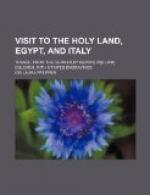This was my last excursion; on the following day, the 7th of November, at three in the morning, I left Naples. Apart from the delightful reminiscences of lovely natural scenes, I shall always think with pleasure on my sojourn in Naples in connexion with Herr Brettschneider and his lady. I was a complete stranger to them when I delivered my note of introduction, and yet they at once welcomed me as kindly and heartily as though I had belonged to their family. How many hours, and even days, did they not devote to me, to accompany me sometimes to one place, sometimes to another; how eagerly did they seek to shew me all the riches of nature and art displayed in this favoured city! I was truly proud and delighted at having found such friends; and once more do I offer them my sincere thanks.
CHAPTER XX.
Caserta—Costume of the peasants—Rome—Piazza
del Popolo—Dogana—
St. Peter’s—Palaces—Borghese,
Barberini, Colonna, etc.—Churches—
Ancient Rome—The Colliseum—Departure
for Florence—Bad weather—
Picturesque scenery—Siena—Florence—Cathedral
and palaces—
Departure from Florence—Bologna—Ferrara—Conclusion.
November 7th.
I travelled by the mail-carriage. By seven in the morning we were at Caserta, and an hour later at Capua, a pretty bustling town on the banks of a river. Our road was most picturesque; we drove among vineyards and gardens through the midst of a lovely plain. On the right were mountains, increasing in number as we proceeded, and imparting a rich variety to the landscape. At noon we halted before a lovely inn. From this point the country increases in beauty at every step. The heights are strikingly fertile, and in the valley an excellent road winds amid pleasant gardens. The mountains frequently seem to approach as though about to form an impenetrable pass; while ruins crown the summits of the rocks, and give a romantic appearance to the whole. At about three o’clock we reached the little town of Jeromania, lying in the midst of vegetable-gardens. Above this town the handsome convent of Monte Cassino stands on a rock, and in its neighbourhood we notice the ruins of an amphitheatre.




